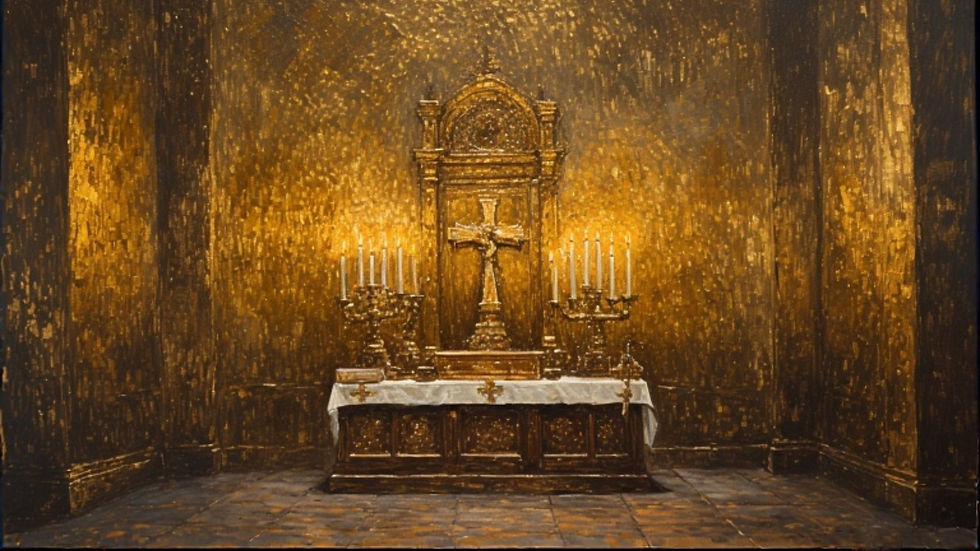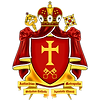How Ancient Orthodoxy is Genuinely Orthodox, Catholic, and Christian
- Jun 13, 2025
- 4 min read
Updated: Aug 13, 2025

The following is a commentary provided that explains what the Ancient Orthodox Catholic Apostolic Church is, of which this Antiochian Metropolitanate is part of. This commentary on Ancient Orthodoxy has been written and published for the sake of those seeking to understand what Ancient Orthodoxy is, and how it is genuinely Orthodox, Catholic, and Christian.
Many Protestants, and even some Roman Catholics and Greek Orthodox, have seen that we call ourselves a part of the Ancient Orthodox Catholic Apostolic Church. We are Orthodox, but not Russian or Greek Orthodox. We are one of the greatest mysteries of Christianity. We are an Orthodox Christianity that seeks to be a multicultural example of unity in the one Christian faith, which, like our separated Roman Catholic brothers, welcomes Anglicans, other Orthodox Christians, Charismatics and Pentecostals, Baptists, Methodists, and others under our jurisdiction through orders, ordinariates, and autonomous churches to fulfill John 17:21 without assimilation, according to the Lord Jesus the Christ's instructions according to Mark 9:38-41, when He rebuked those zealous disciples for fighting against their own brothers of another Christian tradition.
Inquiring minds have asked us many questions about our identification for several years, especially as we continue to work among Protestants and other Christian traditions by supporting interfaith efforts in missionary work and starting churches, for example. For these reasons, we have decided to offer a simplified explanation of Ancient Orthodoxy (in contrast with our usual extended verbiage) and its similarities and differences with the Protestant Church especially (Anglican, Baptist, Methodist, Charismatic-Pentecostal, and nondenominational or interdenominational). The following is presented, to reveal that we are genuine Christians seeking to be in continuity with and as the early Church of God.
What a Charismatic-Pentecostal or any other Protestant would call "holiness" or "sanctified," we prefer to use the Greek term "theosis." Others also prefer to call it "the state of innocent Adam." These terms evoke the act of being in union with God since the creation of humanity.
What has been considered a "presidium" or "board of elders or bishops," we maintain the historically established definition of "synod." The synod collaborates, debates, etc., until a consensus is reached in the work of the Holy Spirit. We believe that through the Holy Spirit, error is not revealed and that the Church is preserved, as promised to those who remain faithful in the Lord.
What many consider "spiritual or apostolic fathers" with whom they seek counsel and prayer, we defend in the same way. However, they are honored as bishops and presbyters or priests of the Church, with whom the mystery or sacrament of confession is performed in the same way. It is purely biblical, since transgressions are mutually confessed and prayers are offered for one another. However, no one is obligated to confess as in our separated Roman Catholic brother's tradition.
What has been called "the order of service" or "the agenda," we have called, since the earliest days of Christianity, "the liturgy." It is a time of singing, prayer, reading of Scripture, edification in sermons, the celebration of the Lord's Supper, and the blessing of the people until we gather corporately at the altar. This includes a physical altar, where we understand that miracles continue to occur. If there is an altar before the Throne of God, and an altar in His ancient temples, synagogues, and churches, then today an altar is needed in our physical churches. And that altar is more than a mere symbol, but the centerpiece.
We have always defended what has been called a "class for new believers" as a "catechism," and what has been erroneously called a catechism for pastors and bishops, we call "vocational training," since we do not catechize the clergy, but rather new believers in the Christian faith. Catechizing a cleric would mean that they are a novice, something against which Holy Scripture and Holy Tradition warn.
What has been called "being filled with the Holy Spirit" we then understand as "Chrismation." However, speaking in tongues is not the initial evidence. It is a Pentecostal innovation that blasphemes the work of the Holy Spirit in the Church since its beginning. Being filled with the Holy Spirit means walking as Jesus walked. That is the true initial evidence, where people show the fruits of the Holy Spirit.
What has been called the "universal Church," composed of Christians of the various denominations who exist for various reasons (whether divinely necessary or not), we understand, according to Acts 9:31 in its Koine Greek manuscripts, as the "catholic Church," but not as the Catholic Church in Rome, which sought to appropriate the identity of Catholicism, as the Byzantines did with Orthodoxy, and as the Classical and Apostolic Pentecostals or Oneness did with the works of Pentecost. Rather, we know, by studying the original languages, that the biblical Church of God used the word "catholic" in Greek, and that this signifies the entire, worldwide Church, composed of all nations and cultures, where cultural distinctions are celebrated as long as they glorify God and do not become measures of Pharisaic dogmatism.



Comments